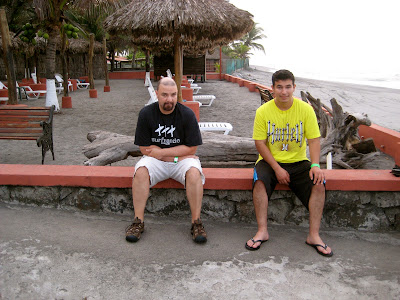 |
| "This is the only cutting I do!" |
Leila is also from El Salvador. She grew up in a little village called Alegria. She left when she was very young and hadn't been back for years. She was the one who knew how to eat the interesting local fruits the Ladies of Pediatrics Association brought us for snacks. She also spoke to the patients and I think talking to her helped them feel calmer before their surgeries. She talked to the local doctors and staff members and they would always get all excited when they heard she was from El Salvador.
Our last day in the hospital was Friday. We did rounds and saw all the patients, the doctors changed some casts, the nurses packed up all the equipment, and I went over the care plans for all the patients with one of the our doctors and one of the local doctors. After this we headed to the bus.
We would be flying out on Saturday afternoon so we had about 24 hours to get some R&R at a little beach hotel near the airport.
But! As a surprise, we stopped in Alegria for lunch on our way.
It is a very sweet little town, apparently the flower capital of El Salvador.
We had lunch.
And checked out the restaurant grounds.
There were lots of flowers and also birds.
Including cages that held one rooster by itself as far as the eye could see (so draw your own conclusions about that).
We only had about 30 minutes to explore the actual town of Alegria so Leila took us on a little mini tour and showed us her old school.
Then we walked down the road...
... to Leila's old house!
She used to live there with her grandmother and her grandmother's sister. "We used to have a bench here out front," Leila told us, "and lots of flowers."
We walked around her neighborhood for awhile. It looked like many of the houses on Leila's old street had been boarded up and there weren't many people around.
On our way back into the main square of town we passed by a little house where some people were sitting out front, including a little old woman. Leila called hello to the people and asked if they had known a woman named Gloria Lopez (her grandmother).
The little old woman sitting on the porch squinted at Leila for a moment, then she jumped to her feet and ran down the steps, crying out "Leila!" She reached Leila and grabbed her arm, holding hands with her, hugging her, "Leila Leila Leila!" She remembered Leila from when she was a little girl; she had been one of her neighbors. Soon the two of them were hugging and crying.
All of us who were watching were crying too.
The woman asked if Leila could stay for a little while but we had to leave. The coordinators wanted us to travel by day, especially since we had a police escort.
 |
| El Salvador: Two Thumbs Up |
We headed off for the coast, where my dad announced "Drinks are on the docs tonight!"
We only had one day there, one day left in El Salvador, so we wanted to make the most of it. Some of us got up veeery early to watch the sunrise.
But apparently not quite early enough...
Ah well. We still managed to do lots of lounging around and having fun on our last day.
And then we had to go.
I said goodbye to El Salvador.
I said goodbye to the sun and the beach and the heat and the people and the piece of my heart that would stay there.
And I made a wish to be able to go back someday.



















































